Foreign
Six Police officers, others killed as gunmen attack Churches

Gunmen on Sunday attacked synagogues and churches in Russia’s North Caucasus region of Dagestan, killing a priest, six police officers, and a member of the national guard, security officials said.
The attacks took place in Dagestan’s largest city of Makhachkala and in the coastal city of Derbent, where gunfights were ongoing.
Russia’s Investigative Committee said it had opened criminal probes over “acts of terror”, while the hunt for the gunmen was ongoing.
Witnesses could hear shooting near a church in Makhachkala while shootouts were continuing in Derbent, the TASS state news agency reported. Dagestan’s interior ministry said it had killed two of the gunmen in Makhachkala.
Sunday is a religious holiday in the Russian Orthodox Church called Pentecost Sunday. Dagestan is a largely Muslim region of Russia, neighbouring Chechnya.
“This evening in the cities of Derbent and Makhachkala armed attacks were carried out on two Orthodox churches, a synagogue and a police check-point,” said the National Antiterrorism Committee in a statement to RIA Novosti news agency.
“As a result of the terrorist attacks, according to preliminary information, a priest from the Russian Orthodox Church and police officers were killed.”
In all, six police officers had been killed and another 12 wounded in the attacks, the spokeswoman for Dagestan’s interior ministry, Gayana Gariyeva, told RIA Novosti.
Russia’s National Guard said one of its officers had been killed in Derbent and several others wounded.
A 66-year-old priest was killed in Derbent, the press secretary of Dagestan’s interior ministry, Gariyeva told the agency.
– Synagogues on fire –
Dagestan’s RGVK broadcaster named the priest as Nikolai Kotelnikov,saying he had served more than 40 years in Derbent.
“The synagogue in Derbent is on fire,” the chairman of the public council of Russia’s Federation of Jewish Communities, Boruch Gorin wrote on Telegram.
“It has not been possible to extinguish the fire. Two are killed: a policeman and a security guard”.
He added: “The synagogue in Makhachkala has also been set on fire and burnt down.”
Gorin wrote that in Derbent, firefighters had been told to leave the burning synagogue because of the risk that “terrorists remained inside”.
He added: “There is shooting in the streets around the synagogue”.
The leader of Dagestan, Sergei Melikov, wrote on Telegram: “This evening in Derbent and Makhachkala unknown (attackers) made attempts to destabilise the situation in society.
“They were confronted by Dagestani police officers.”
Russia’s FSB security service in April said it had arrested four people in Dagestan on suspicion of plotting a deadly attack on Moscow’s Crocus City Hall concert venue in March, which was claimed by Islamic State.
Militants from Dagestan are known to have travelled to join the Islamic State group in Syria.
In 2015, the group declared it had established a “franchise” in the North Caucasus.
Dagestan lies east of Chechnya where Russian authorities battled separatists in two brutal wars, first in 1994-1996 and then in 1999-2000.
After the defeat of Chechen insurgents, Russian authorities have been locked in a simmering conflict with Islamist militants from across the North Caucasus that has killed scores of civilians and police.
AFP
Foreign
Massive explosion at Iran port kills at least 14 people, injures 750
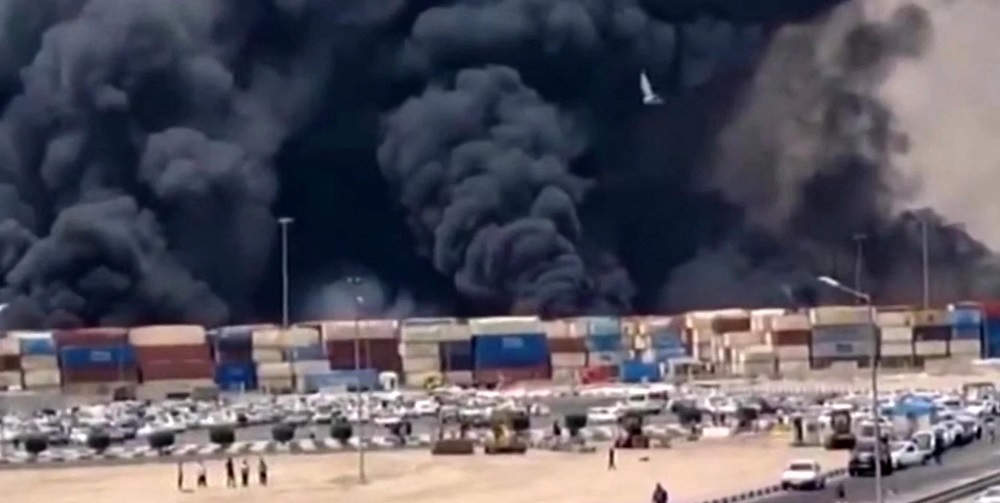
A massive explosion and fire rocked a port Saturday in southern Iran purportedly linked to a shipment of a chemical ingredient used to make missile propellant, killing 14 people and injuring around 750 others.
Helicopters and aircraft dumped water from the air on the raging fire through the night into Sunday morning at the Shahid Rajaei port. The explosion occurred just as Iran and the United States met Saturday in Oman for the third round of negotiations over Tehran’s rapidly advancing nuclear program.
No one in Iran outright suggested that the explosion came from an attack. However, even Iranian Foreign Minister Abbas Araghchi, who led the talks, on Wednesday acknowledged that “our security services are on high alert given past instances of attempted sabotage and assassination operations designed to provoke a legitimate response.”
State media offered the casualty figures. But there were few details on what sparked the blaze just outside of Bandar Abbas, causing other containers to reportedly explode.
Security firm says port received chemical for missile fuel
The port took in a shipment of the missile fuel chemical in March, the private security firm Ambrey said. The fuel is part of a shipment of ammonium perchlorate from China by two vessels to Iran first reported in January by the Financial Times. The chemical used to make solid propellant for rockets was going to be used to replenish Iran’s missile stocks, which had been depleted by its direct attacks on Israel during the war with Hamas in the Gaza Strip.
“The fire was reportedly the result of improper handling of a shipment of solid fuel intended for use in Iranian ballistic missiles,” Ambrey said.
Ship-tracking data analyzed by The Associated Press put one of the vessels believed to be carrying the chemical in the vicinity in March, as Ambrey said. Iran hasn’t acknowledged taking the shipment. The Iranian mission to the United Nations didn’t respond to a request for comment on Saturday.
It’s unclear why Iran wouldn’t have moved the chemicals from the port, particularly after the Beirut port blast in 2020. That explosion, caused by the ignition of hundreds of tons of highly explosive ammonium nitrate, killed more than 200 people and injured more than 6,000 others. However, Israel did target Iranian missile sites where Tehran uses industrial mixers to create solid fuel.
Social media footage of the explosion on Saturday at Shahid Rajaei saw reddish-hued smoke rising from the fire just before the detonation. That suggests a chemical compound being involved in the blast — like in the Beirut explosion.
“Get back get back! Tell the gas (truck) to go!” a man in one video shouted just before the blast. “Tell him to go, it’s going to blow up! Oh God, this is blowing up! Everybody evacuate! Get back! Get back!”
On Saturday night, the state-run IRNA news agency said that the Customs Administration of Iran blamed a “stockpile of hazardous goods and chemical materials stored in the port area” for the blast, without elaborating.
An aerial shot released by Iranian media after the blast showed fires burning at multiple locations in the port, with authorities later warning about air pollution from chemicals such as ammonia, sulfur dioxide and nitrogen dioxide in the air. Schools and offices in Bandar Abbas will be closed Sunday as well.
Port a major destination for Iranian cargo
Shahid Rajaei has been a target before. A 2020 cyberattack attributed to Israel targeted the port. It came after Israel said that it thwarted a cyberattack targeting its water infrastructure, which it attributed to Iran. Israeli officials didn’t respond to requests for comment regarding Saturday’s explosion.
Social media videos showed black billowing smoke after the blast. Others showed glass blown out of buildings kilometers, or miles, away from the epicenter of the explosion. State media footage showed the injured crowding into at least one hospital, with ambulances arriving as medics rushed one person by on a stretcher.
Hasanzadeh, the provincial disaster management official, earlier told state television that the blast came from containers at Shahid Rajaei port in the city, without elaborating. State television also reported that there had been a building collapse caused by the explosion, though no further details were offered.
The Interior Ministry said that it launched an investigation into the blast. Iranian President Masoud Pezeshkian also offered his condolences for those affected in the blast.
Shahid Rajaei port in Hormozgan province is about 1,050 kilometers (650 miles) southeast of Iran’s capital, Tehran, on the Strait of Hormuz, the narrow mouth of the Persian Gulf through which 20% of all oil traded passes.
Foreign
Judge halts Trump’s shutdown of Voice of America
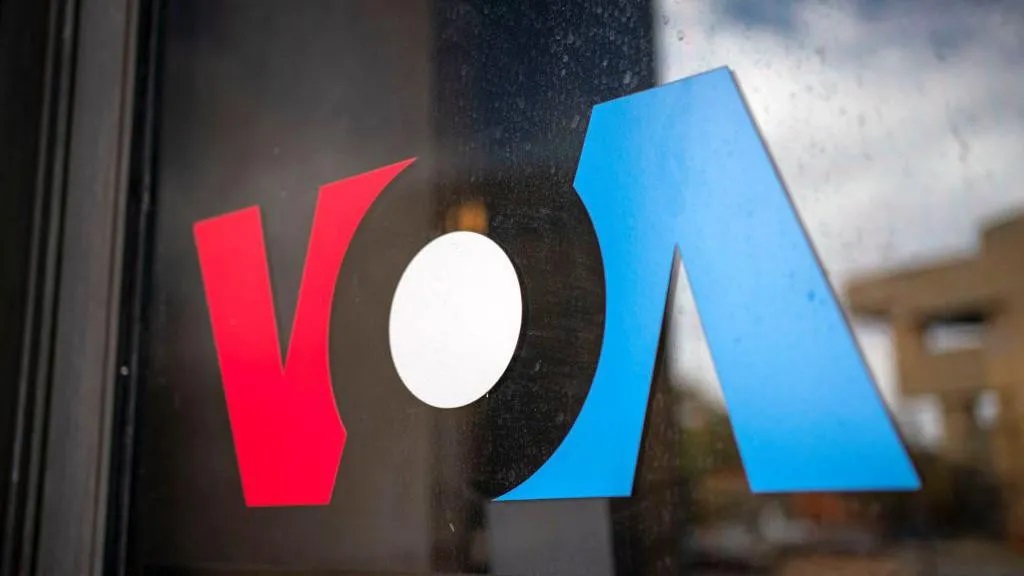
A federal judge has ordered the Trump administration to restore all jobs and funding for the Voice of America and other US-backed news outlets, ruling that efforts to dismantle it violated the law and Constitution.
Over 1,300 VOA employees, including about 1,000 journalists, were placed on leave following President Donald Trump’s order. The White House has accused the broadcaster of being “anti-Trump” and “radical”.
VOA, still primarily a radio service, was set up during World War II to counter Nazi propaganda, and has become a major global media broadcaster.
The ruling noted that because of the cuts, “VOA is not reporting the news for the first time in its 80-year existence”.
Judge Royce Lamberth said the administration acted “without regard to the harm inflicted on employees, contractors, journalists, and media consumers around the world”.
He ordered the administration to take steps to restore employees and contractors to the jobs they had prior to the executive order, and to do the same for Radio Free Asia and the Middle East Broadcasting Networks.
The judge found the administration also likely violated the International Broadcasting Act and Congress’ power to appropriate funding.
“My colleagues and I are grateful for this ruling. But we know that this is just a small step forward, as the government is likely to appeal,” said Patsy Widakuswara, the VOA White House bureau chief and a lead plaintiff in the lawsuit.
“We are committed to continuing to fight against what we believe is the administration’s unlawful silencing of VOA until we can return to our congressional mandate: to tell America’s stories with factual, balanced, and comprehensive, reporting,” she said.
Trump has long criticised VOA as part of his broader attacks against the media, frequently accusing mainstream outlets of bias.
After taking office in January, he appointed a political ally, Kari Lake, to run VOA. Lake has previously supported Trump’s false claims that the 2020 election was stolen from him.
In March, Trump ordered the US Agency for Global Media (USAGM), which oversees VOA and funds outlets like Radio Free Europe and Radio Free Asia, to be “eliminated to the maximum extent consistent with applicable law”.
A separate judge in New York temporarily blocked the executive order after journalists, advocacy groups and unions sued, arguing the move was unlawful.
Judge Lamberth, who is based in Washington, DC, ruled the Trump administration lacked the authority to shutter VOA, which is funded by Congress and has a legislative mandate to deliver credible news globally.
“It is hard to fathom a more straightforward display of arbitrary and capricious actions than the Defendants’ actions here,” he wrote.
“Even though several courts have ruled that the President can remove personnel and terminate grants, a radical district judge is once again attempting to interfere with the Trump Administration’s efforts to make the government more efficient,” White House spokesperson Taylor Rogers said in a statement.
USAGM did not immediately respond to a request for comment.
Foreign
Pope Francis Death: Italy, Argentina 25 other Countries Declared National Mourning (Full List)

The world stood still on April 21, 2025, as the Vatican officially confirmed the death of Pope Francis, aged 88. His passing marked the end of a historic papacy and triggered an outpouring of grief across continents. Numerous nations, especially those with significant Catholic populations, declared national mourning periods to honor the pontiff’s life, spiritual leadership, and global influence.
From Latin America to Europe, Asia, and Africa, countries initiated solemn observances, lowered national flags to half-mast, and held public commemorations. This article highlights the full list of countries that declared national mourning in memory of Pope Francis.
Why Pope Francis’s Death Resonated Globally
Pope Francis, born Jorge Mario Bergoglio in Buenos Aires, Argentina, was the first Jesuit and the first Latin American pope in the history of the Catholic Church. Since his election in 2013, he championed issues such as poverty alleviation, climate action, interfaith dialogue, and social justice, making him a spiritual leader not just for Catholics, but for people of all faiths.
His legacy transcended religious boundaries, prompting state-led tributes even in non-Catholic majority nations.
List of Countries That Declared National Mourning for Pope Francis
Below is a country-by-country breakdown of declared national mourning periods:
| Country | Mourning Period | Remarks |
|---|---|---|
| Argentina | 7 days (Apr 22–28) | Pope Francis’s homeland; nationwide memorial services held. |
| Brazil | 7 days | Churches and public buildings observed solemn tributes. |
| East Timor | 7 days | Predominantly Catholic nation with extensive observances. |
| Italy | 5 days (Apr 21–26) | Vatican’s host country; held massive state ceremonies. |
| Costa Rica | 4 days | Flags at half-mast; public prayers offered. |
| Spain | 3 days | Public processions and masses conducted. |
| India | 3 days | Interfaith tributes and official condolences shared. |
| Philippines | 3 days | Nation-wide tributes; churches filled with mourners. |
| Poland | 3 days | Mourning coincided with the Pope’s funeral. |
| Portugal | 3 days | Official services in Lisbon and major cities. |
| Lebanon | 3 days | Christian and Muslim leaders offered joint prayers. |
| Venezuela | 3 days | Government-organized memorials. |
| Chile | 3 days | National flags at half-mast; televised funeral services. |
| Cuba | 3 days | Nationwide mourning with Catholic mass ceremonies. |
| Guatemala | 3 days | Memorial services across Catholic institutions. |
| Panama | 3 days | Official decree and observances. |
| Dominican Republic | 3 days | Nationwide religious services held. |
| Paraguay | 3 days | Church bells rang across the country in honor. |
| Peru | 3 days | Large public gatherings held for prayers. |
| Ecuador | 3 days | Tributes from religious and government figures. |
| Puerto Rico | 3 days | Government-declared mourning period observed. |
| Malta | 1 day (Apr 26) | Marked during the Pope’s funeral. |
| Croatia | 1 day | Flags lowered; public messages of condolence shared. |
| Hungary | 1 day | National mourning aligned with funeral rites. |
| Uruguay | 1 day | Ceremonies held in Catholic schools and churches. |
| Cape Verde | 1 day | Special services held across Catholic communities. |
Global Religious and Political Reactions
World leaders, religious figures, and citizens across continents expressed grief and paid glowing tributes to Pope Francis’s legacy. The United Nations, European Union, and African Union all issued statements acknowledging his contributions to world peace, interreligious harmony, and humanitarian service.
In cities like Manila, Rome, Buenos Aires, and Lagos, candlelight vigils were held. Cathedrals rang their bells in synchronized tribute, while mosques and temples also joined in interfaith memorial services.
Pope Francis’s death has left a void in the global religious and moral conscience. His efforts to promote compassion, inclusiveness, and humility in leadership will continue to inspire generations to come.
While the Vatican prepares for a papal conclave to elect a successor, the world continues to reflect on the lessons and legacy of a pope who bridged faith and humanity in unprecedented ways.
The widespread declaration of national mourning in countries around the world highlights just how impactful Pope Francis was—not only to Catholics but to people of all beliefs. His death marks the end of a deeply influential era in the Church’s history.
May his soul rest in peace.
-
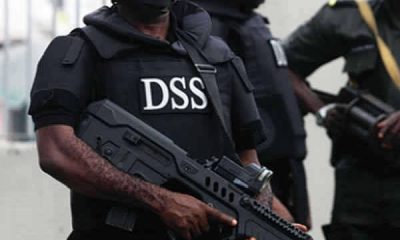
 News17 hours ago
News17 hours agoDSS arrests Army major for planning unrest in Delta
-
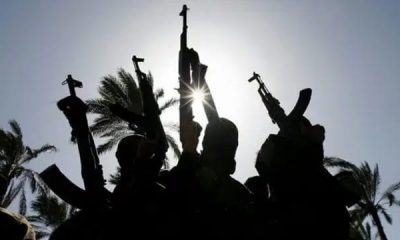
 News10 hours ago
News10 hours agoGunmen abduct two senior LG workers, three others
-

 News18 hours ago
News18 hours agoFCT minister, Wike announces new appointments
-

 Politics18 hours ago
Politics18 hours agoSee list of APC Delta stakeholders holding meeting in Abuja on power sharing formula with Oborevwori
-
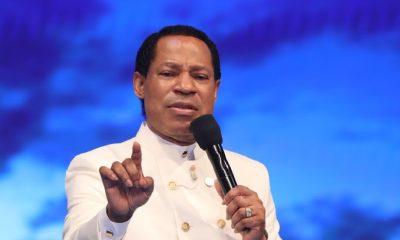
 News18 hours ago
News18 hours agoCOVID-19 Vaccine Killed Pope Francis, says Pastor Oyakhilome
-
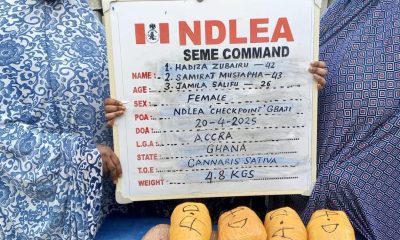
 News11 hours ago
News11 hours agoNDLEA storms Lagos hotel, recovers N1.042billion illicit drug consignments(Photos)
-
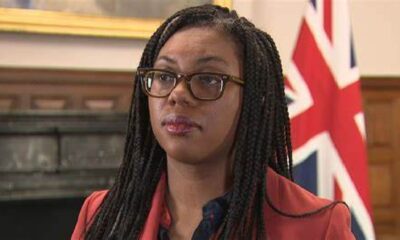
 News18 hours ago
News18 hours agoUK Tories mull replacing Badenoch as party leader after poor ratings
-

 News11 hours ago
News11 hours agoArmy Chief condemns beating, harassing civilians in military uniform says, it’s wrong






